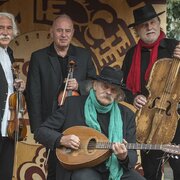
Songs
- 1 Muzsikas and Amadinda: Arrival
- 2 Muzsikas and Amadinda: Táncdallamok [Dance tunes] (Gyimes, Transylvania)
Videos
- country:Hungary
- style(s):Folk, World
- label:Fonó Music Hall
- type:Band
- gender:male
- instrumentation:string
- artist posted by:Fonó Music Hall
Line up
- Dániel Hamar ( bass, gardon, vocal)
- László Porteleki (violin, koboz, vocal)
- Mihály Sipos (violin, citera, vocal)
- Péter Éri (viola, mandolin, flutes, vocal)
Links
The WINNER of the WOMEX Award 2008!
The 45 years old HUNGARIAN FOLK MUSIC ENSEMBLE: MUZSIKAS
Muzsikas will be performing at WOMEX to open the Sunday Awards ceremony. Here you can watch the event online:
https://www.womex.com/virtual/piranha_arts_1/event/womex_20_award
VISIT MUZSIKAS' CHATROOM: https://chat.womex.com/womex-20/channels/muzsikas
MUZSIKAS' NEW CD with AMADINDA Percussion Group WAS RELEASED IN DECEMBER 2019 by Fonó Music Hall. More information:
http://webbolt.fono.hu/en/muzsikas.amadinda
BIO
After 45 years of their unrivaled career, MUZSIKAS is the most renowned and popular Hungarian folk music ensemble worldwide and in their home-country as well. MUZSIKAS pioneered the global acceptance of Hungarian folk music that is now equal with all the other styles of music. Due to their unique musical skills, instrumental knowledge and musical versatility, they can cope with playing on different music scenes, collaborating with various noted musicians and groups, from folk and world-music to classical and jazz, and even to alternative rock music (they played with Woven Hand in 2008).
They have toured all over the world including nearly every European country, in addition to North-America, Japan, Australia and New Zealand, Hong Kong, Singapore and Taiwan. They have already presented their exceptional live performances at the greatest festivals and in the most significant concert halls, such as the Royal Festival Hall, Royal Albert Hall, Barbican Center and Queen Elisabeth Hall in London, Theatre de la Ville and Cite de la Music in Paris, Santa Cecila Academy in Rome, Concertgebouw in Amsterdam, and Carnegie Hall in New York.
As the first Hungarian folk ensemble accepted by the classical music scene, they combined traditional music with the classical compositions of Bartok, Kodaly, Kurtag and Ligeti. They achieved to fuse 20th century Hungarian classical and traditional Hungarian folkmusic, hereby, saved for the future generations, the heritage of Bela Bartok, the greatest Hungarian composer and collector of traditional music.
MUZSIKAS' musical collaborations include solists like Alexander Balanescu, Roel Dieltiens, Jeno Jando; string quartetts chamber like Takacs Quartet, Keller Quartet, Bartok Quartet; and choirs and symphonic orchestras such as Pro Musica Girls' Choir, Tomkins Vocal Ensemble and The BBC Scottish Symphony Orchestra, The London Sinfonietta Orchestra, The Orchestra of Radio France and The Danubia Symphony Orchestra.
MUZSIKAS' music appears in the film of the Oscar winner director Costa Gavras, "Music Box" that also received the first prize at the Berlin film festival in 1989. They have provided the music for a contemporary dance piece titled "Dancing Room" which was performed in several theaters in England and filmed by BBC. Amongst various prizes, they were awarded the most respected Hungarian State award for artists, the Kossuth Prize, and in 2008 they received the prestigious WOMEX Award for World Music as well.
MUZSIKAS is a name given to musicians playing traditional folk music in Hungarian villages. Their performance is an exciting musical experience where the audience is transferred back to the remote Hungarian village atmosphere where traditions survived through the centuries. Members of the group play and improvise in the style of the old traditional Hungarian folk bands in which the solo violin and the song typically were accompanied by the three-stringed viola and the contrabass.
The music of MUZSIKAS can be characterized as the traditional arrangements of authentic Hungarian folk music featuring a style that is typical of the best village musicians. It has nothing in common stylistically with the Gypsy-Hungarian style, but is rather the true folk music of Hungary, the most beautiful melodies of which were considered by Bela Bartok to be equal with the greatest works of music.







